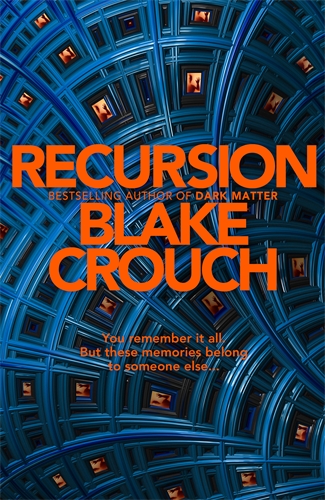
The world folds in on itself. Someone knows what's coming before it happens, subverting the future with highly attuned déjà fu. A book takes a while to reveal itself, and traverses multiple genres to get there. This is Recursion.
In 2018, Barry Sutton investigates the suicide of a woman suffering from False Memory Syndrome, a sensation where sufferers remember two contradictory lifetimes at once. In 2008, neuroscientist Helena Smith is approached to apply her research towards a chair that will help capture and reinforce the memories of those facing degenerative brain diseases. When Sutton and Smith's stories dovetail, the world may be in danger.
Recursion is a book that opens itself to the reader as it progresses, ostensibly claiming to be about one, mildly interesting, thing, and then gradually transforming into another, far deeper and more satisfying piece. It is unfortunate that a review has to couch Crouch in uncertain terms, but hopefully the quality of the book is communicated.
At the beginning, Recursion is an incredibly vague piece. The crime that Barry investigates isn't exactly a crime, and he has no idea what any of the clues mean. It's a kind of plodding detective work that gets the story started. The Helena side of things is instantly more engaging but, being ten years removed from the "present†action, does not feel near so immediate.Â
This is a novel of accumulation, however, and as the pieces come together they become something more. Crouch's concepts only make the most tangential sort of sense, so most readers would not be able to conceive of them. The mechanics are bizarre in the best way, and Crouch uses them to consistently surprise. It's not that Recursion is a meditation on the nature of memory, but about the concept of memory as objective truth; as such, the book becomes a parade of impossible things, leveraged into a story that is by turns loudly rollicking and quietly moving. Even when the story and structure seem to run counterintuitive to sense, Crouch's logic dazzles.
The narrative intricacy of Recursion would mean nothing without the character work on display. Barry is very much a hardboiled policeman with a tragic past bused in from central casting, but Crouch shapes him through plot developments and his eventual dynamic with Helena, the true heart of the novel. Helena is such an expertly rendered character that often it feels like the focus should be more on her and less on Barry, but ultimately Crouch's characterisation is as well-executed as his plotting; more novels should have conclusions as satisfying as the crescendo of Recursion.
In Recursion, Blake Crouch offers readers a book that may sound conceptually familiar, but the final page is so far removed from the first that it would be unreasonable to say that you expected to land there. A work composed largely of leaps of faith centred around a brilliant woman, Recursion deserves to be the breakout science fiction hit of the year.


